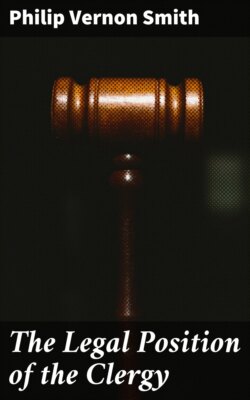Читать книгу The Legal Position of the Clergy - Philip Vernon Smith - Страница 3
На сайте Литреса книга снята с продажи.
PREFACE
ОглавлениеTable of Contents
In the following pages an endeavour has been made to give a succinct sketch of the legal position of the parish clergy of the Church of England in respect both of spiritualities and of temporalities. The book, being intended for their use, does not touch upon the subject of ordination by which they acquired the status of deacons or priests. Nor does it deal with the episcopate or the non-parochial clergy, except so far as these subjects are connected with the parochial system.
Like all other human arrangements, our English Church law is, of course, far from being ideally perfect. It may be safely affirmed that there has never been either a Church or a State in which the law has actually been what it ideally ought to have been. It is important to recognise the difference between the two positions; for there has sometimes been a disposition on the part of individuals to confuse them, and to treat what they consider to be the ideal law, as if it were the actual law, and as if, as such, it demanded their loyal obedience. Such an attitude, whether in ecclesiastical or civil matters, is anarchical in its tendency; for it sets up private judgment instead of the constituted authority as the criterion of what ought or ought not to be done. It can only be justified where the actual law is absolutely inconsistent with the fundamental principles of morality or of Christian truth. The object of the present treatise is to state succinctly what the law is—not what it ought to be; and no opinion is expressed or suggestion offered as to points in which amendment would be proper or expedient.
Within the limited compass of the book it is obviously impossible to enter into details; and the reader who desires information as to these will find them in the authorities to which reference is made. It must also be borne in mind that the general law on the subject of buildings, property, and pecuniary rights is, in various places, modified by special local enactments or customs. These can only be ascertained on the spot, or by consulting the Acts of Parliament in which they are embodied or recorded.
One other word of caution is desirable. In explaining the legal position of the parochial clergy, it is, of course, necessary to indicate the exact limits of their rights. If they venture beyond these limits, they are manifestly in the wrong. But no community, either ecclesiastical or civil, could maintain its well-being, or even its coherence, if every individual were on all occasions to take advantage of the full tether of his legal rights. It will frequently be wise and proper for the clergy, in their relations with their ecclesiastical superiors or with the lay officials and other laity of the parish, not to adopt the most uncompromising attitude which the letter of the law permits to them. The dictates of love and of Christian forbearance, and of consideration for the claims of others, as well as of expediency, will not warrant the infringement by an individual of the ordinances of either the Church or the State. But they will more than justify him in refraining from taking up a position of defiance which these ordinances may strictly entitle him to assume.
P. V. SMITH.
Easter, 1905.
